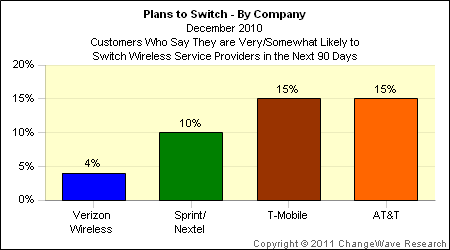ChangeWave: 15% of AT&T subscribers are ready to switch, even without Verizon iPhone

In less than 24 hours, three different analyst firms released mobile market findings or projections, just days after Verizon announced it would begin selling iPhone 4 in early February. ChangeWave joins Canalys and ComScore.
I want to thank Betanews reader Ilan Lev for pointing out the ChangeWave study, which I hadn't seen. However, as is typical of ChangeWave data, the blog post presenting it puts the emphasis in the wrong place. In a survey conducted before the Verizon iPhone announcement, 16 percent of US respondents said they would switch from AT&T to Verizon. However, that number isn't nearly as big as it seems. ChangeWave also generally asked the 4,500 respondents their switching intentions from all the major carriers. Fifteen percent of respondents said they plan to switch from AT&T within 90 days. From that perspective, the immediate benefit to Verizon is marginal at best.
Canalys and ComScore base their analyses on actual sales trends. ChangeWave surveys people about their buying intentions, which often are not representative of sales trends. What people say they want to do often differs from what they will do. Timing also is a factor. ChangeWave conducted the survey in December, when mobile bargains like instant rebates and two-for-one specials make switching more attractive. Unsurprisingly, Verizon, the king of two-fors, had lowest switching intention -- just 4 percent. Verizon also has better reputation for network reliability than AT&T.
But there is potential benefit for Verizon long-term. Based on that 16-percent switching intention, Verizon could add more iPhone subscribers than for other devices. ComScore data shows that iPhone users are the most loyal, with 54.6 percent sticking with their carrier for more than three years. ChangeWave's data shows that Verizon subscribers are the most loyal -- iPhone customers on Verizon could prove to be long-termers, which is what every carrier wants.
ChangeWave's survey about switching intentions concurs with other data about AT&T losing subscribers -- 7 percent decline smartphone market share in 2010, according to ComScore; that trend is independent of a Verizon iPhone. Most intended AT&T switchers blame the network -- poor reception coverage (42 percent) and dropped calls (27 percent) are main reasons. "AT&T's churn rate is its worst ever in a ChangeWave survey," Paul Carlton, ChangeWave's vice president of research. explained in a blog post dated Jan. 6, 2011. The data he cited is from a ChangeWave report released a week earlier -- before the Verizon iPhone announcement.
The most surprising data point also is the most unbelievable -- that 26 percent of existing iPhone users are "saying they'll leave AT&T for Verizon," Carlton writes. That one data point would have been a helluva pageview-driving headline for a Friday afternoon. I couldn't do that; credibility of the 26-percent data point is suspect, and for no fault by ChangeWave.
ChangeWave's iPhone-switching-data is unreliable, simply because the survey was conducted before Verizon announced it would carry iPhone. Details weren't yet available about the device or pricing, and, again, what people say they'll do -- particularly about something hypothetical -- is often different from what they eventually will do. What will be hugely meaningful: Using this ChangeWave survey and the next one to compare switching intentions before and after the Verizon iPhone announcement. That should give a more insightful look into what might actually happen in the US phone market.
Upate: After posting, I stumbled upon "Europe Shows Why Verizon iPhone May Help AT&T Fortunes," by Bobbie Johnson at GigaOM. There's a hint about what could happen with AT&T and Verizon in what happened in United Kingdom when O2 lost iPhone exclusivity. "Suddenly the iPhone was everywhere," Johnson writes. "People had expected an exodus from O2, but it didn't seem to happen that way. In fact, the company that had most to lose seemed to benefit: iPhone sales seemed to accelerate. In February 2010, just after its rivals first started selling the handset, the company announced that it had passed 2 million iPhone sales. By July that year, just four months later, it had racked up another million."
Johnson also warns, regarding the ChangeWave survey, that it's much easier for someone to say they'll switch from AT&T to Verizon for iPhone than to actually do it.